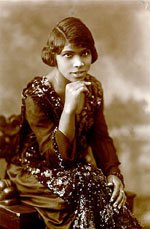Marian Anderson
File:Marian Anderson at Lincoln Memorial.webm
Marian Anderson (February 27, 1897 – April 8, 1993) was an American contralto whose performance at the Lincoln Memorial in 1939 became a pivotal moment in the Civil Rights Movement. Anderson was one of the most celebrated singers of the 20th century, known for her extraordinary vocal range and versatility, as well as her grace and dignity in overcoming racial barriers in the arts.
Early Life[edit | edit source]
Marian Anderson was born in Philadelphia, Pennsylvania, to a schoolteacher mother and an ice and coal salesman father. She showed an early talent for singing, joining the choir at the Union Baptist Church at the age of six. Despite facing financial difficulties, Anderson pursued her passion for music, supported by her community who raised funds for her to attend high school and later, music lessons.
Career[edit | edit source]
Anderson's career began to flourish in the 1920s after winning a singing competition sponsored by the New York Philharmonic. Despite her success, she faced racial discrimination in the United States, often being denied opportunities to perform in certain venues or stay in certain hotels due to her race. In response, Anderson focused her career in Europe for a time, where she was met with critical acclaim.
Her return to the United States in the late 1930s marked a significant turning point. In 1939, the Daughters of the American Revolution (DAR) refused her the use of Constitution Hall in Washington, D.C., because of her race. This led to a public outcry and the intervention of First Lady Eleanor Roosevelt, who resigned from the DAR in protest and helped arrange for Anderson to perform at an open-air concert on the steps of the Lincoln Memorial on Easter Sunday, April 9, 1939. The concert attracted a crowd of more than 75,000 people and millions more listened on the radio, marking a significant moment in the early Civil Rights Movement.
Anderson continued to break barriers throughout her career, becoming the first African-American to perform at the Metropolitan Opera in New York City in 1955. She was also active in the Civil Rights Movement, participating in the 1963 March on Washington and singing at the inauguration of President John F. Kennedy.
Legacy[edit | edit source]
Marian Anderson's legacy is not only that of a pioneering musician but also as a symbol of the struggle for racial equality in the United States. Her Lincoln Memorial concert is remembered as a moment when music transcended racial divisions and brought attention to the injustices faced by African Americans.
Anderson received numerous awards and honors in her lifetime, including the Presidential Medal of Freedom in 1963, the Congressional Gold Medal in 1977, and a Grammy Lifetime Achievement Award in 1991. She was also awarded honorary doctoral degrees from several prestigious universities.
Death[edit | edit source]
Marian Anderson died on April 8, 1993, at the age of 96 in Portland, Oregon. Her life and work continue to inspire generations of musicians and activists.
Search WikiMD
Ad.Tired of being Overweight? Try W8MD's physician weight loss program.
Semaglutide (Ozempic / Wegovy and Tirzepatide (Mounjaro / Zepbound) available.
Advertise on WikiMD
|
WikiMD's Wellness Encyclopedia |
| Let Food Be Thy Medicine Medicine Thy Food - Hippocrates |
Translate this page: - East Asian
中文,
日本,
한국어,
South Asian
हिन्दी,
தமிழ்,
తెలుగు,
Urdu,
ಕನ್ನಡ,
Southeast Asian
Indonesian,
Vietnamese,
Thai,
မြန်မာဘာသာ,
বাংলা
European
español,
Deutsch,
français,
Greek,
português do Brasil,
polski,
română,
русский,
Nederlands,
norsk,
svenska,
suomi,
Italian
Middle Eastern & African
عربى,
Turkish,
Persian,
Hebrew,
Afrikaans,
isiZulu,
Kiswahili,
Other
Bulgarian,
Hungarian,
Czech,
Swedish,
മലയാളം,
मराठी,
ਪੰਜਾਬੀ,
ગુજરાતી,
Portuguese,
Ukrainian
Medical Disclaimer: WikiMD is not a substitute for professional medical advice. The information on WikiMD is provided as an information resource only, may be incorrect, outdated or misleading, and is not to be used or relied on for any diagnostic or treatment purposes. Please consult your health care provider before making any healthcare decisions or for guidance about a specific medical condition. WikiMD expressly disclaims responsibility, and shall have no liability, for any damages, loss, injury, or liability whatsoever suffered as a result of your reliance on the information contained in this site. By visiting this site you agree to the foregoing terms and conditions, which may from time to time be changed or supplemented by WikiMD. If you do not agree to the foregoing terms and conditions, you should not enter or use this site. See full disclaimer.
Credits:Most images are courtesy of Wikimedia commons, and templates, categories Wikipedia, licensed under CC BY SA or similar.
Contributors: Prab R. Tumpati, MD





